As Great Britain Heads To The Polls, Uncertainty Reigns
The political outlook in the United Kingdom is as uncertain as it has ever been.
With voters in the United Kingdom already voting, it appears as if there actual outcome of the General Election will almost certainly not be resolved any time soon:
LONDON—The U.K. will hold one of its most unpredictable elections in decades Thursday, and with no clear winner likely, the stage is set for days of political horse-trading to determine the country’s next leader.
The U.K. has traditionally seen government pass between the two main parties—the Conservatives, currently led by Prime Minister David Cameron, and the Labour Party, led by Ed Miliband. But the latest polls suggest that neither will win a majority of seats in Parliament—and may need more than one other party to cobble one together.
A debate about which party would have the most legitimate claim to govern has begun even before polling booths opened.
The Conservatives are forecast to win the most seats, and are likely to claim that gives them a mandate to continue to lead the U.K. for the next five years.
But Mr. Miliband could be in a position to argue that he has a bigger mandate, by drawing on the support of like-minded parties. Such a scenario would be legal and has happened before in the U.K.
Mr. Cameron said on Tuesday that Mr. Miliband would have a “massive credibility problem” if he tried to become prime minister without Labour winning the most seats.
“We are fighting hard in every seat to win a Labour majority,” a Labour spokeswoman said in response.
The first indication of how things might pan out will emerge with the exit polls, published after voting finishes at 10 p.m. It will likely be early Friday in the U.K. before it is clear which party has won the most seats, though it could take longer.
There are 650 seats in the House of Commons, Parliament’s lower house. While technically a party needs 326 to have a majority, in practice 323 seats is sufficient. That is because the speaker typically abstains from voting and Sinn Féin, the Irish republican party, is expected to refuse to take up its handful of seats.
Some forecasters predict that the Conservative Party could win about 280 seats—roughly 10 or so more than Labour.
In such a scenario, Mr. Cameron could be hard pressed to form a government, even with support from his current coalition partner, the Liberal Democrats.
Polls show the Lib Dems could lose about half of the 56 seats they previously held, and the Conservatives don’t have as many other potential natural allies as Labour does.
If Mr. Cameron throws in the towel and resigns, it would fall to Mr. Miliband to try to form a government. If Labour wins between about 270 and 275 seats itself, Mr. Miliband could find it easier to form a big-enough coalition and become prime minister, pollsters and academics say.
“The Conservatives are on course to be the largest party in the new House of Commons, but it is touch and go whether David Cameron will be able to remain prime minister,” saidPeter Kellner, president of YouGov.
If Mr. Cameron does better than predicted, winning at least about 285 or 290 seats, he could have enough seats to cling on to office with support from the Liberal Democrats and the Northern Irish Democratic Unionist Party.
One other scenario is Mr. Cameron could try to hang on to power, even if he is unable to secure a majority, in an effort to force Labour to rely on backing from the Scottish National Party—which is expected to perform well at this election—to defeat the government.
This would put Labour in a difficult situation, since many in England are opposed to the Scottish party having a say over matters that concern other parts of the U.K.
Mr. Miliband has ruled out making any deal with the SNP, which led last year’s unsuccessful independence drive in Scotland, wary of upsetting voters in favor of the union.
Two bookmakers said betting odds were even Wednesday on whether Mr. Cameron or Mr. Miliband would be the next prime minister, and a third gave Mr. Cameron better odds. Earlier in the week, Mr. Miliband was the favorite.
The New York Times’ Justin Wollers notes that the closeness of the race even has the betting markets confused:
British voters are heading to the polls Thursday, and it looks as if it’s going to be a nail-biter. Political prediction markets suggest that it’s basically a 50-50 bet as to whether the Conservative prime minister, David Cameron, will serve another term or be ousted by Labour’s leader, Ed Miliband. I can recall very few elections where the bookies couldn’t pick a favorite by election eve.
The traditional two-party system is breaking down in Britain, which makes the outcome more uncertain because it renders traditional approaches to predicting the outcome less useful. Multiparty elections bring a type of complexity that traditional polling — and computer models based on polling — are ill-equipped to deal with.
(…)
So here’s what the prediction markets are telling us. The Conservatives have more than a four-in-five chance to win the most votes and the most seats. Even so, they are seen as having less than a one-in-ten chance of being able to form a majority without coalition partners. This is partly because of the Scottish National Party, which is now likely to become the third-largest party, after picking up nearly all of the traditionally Labour-voting seats in Scotland. It is expected to throw its support behind the Labour Party.
Nick Clegg’s Liberal Democrats — the Conservatives’ current coalition partners — are expected to lose a lot of seats to both the Labour Party and the Conservatives, as well as in Scotland. The Liberal Democrats could potentially make a coalition partner with either major party.
Add in the minor players — the Welsh independence party Plaid Cymru; Northern Ireland’s Democratic Unionist Party and Social Democratic and Labour Party; the right-wing populist UK Independence Party; and possibly the Greens or other independents — and a number of possible coalitions emerge. Many of these potential coalitions go Labour’s way, meaning that it’s as likely as the Conservatives to form the next government.
These negotiations are expected to take time, and there’s roughly a 50-50 chance that we still won’t know the outcome a week from now. And if all of this horse-trading comes to naught? The bookies say there’s about a one-in-four chance that Britons will be headed back to the polls again in 2015.
In other words, there’s a whole lot of uncertainty.
One things that seems to have changed somewhat from when I wrote about the British elections last week, is that the Tories seemed to have tightened up their support to some degree to the point where they now look like they will end the night with the largest number of seats in the House Of Commons. The problem that David Cameron is likely to face, though, is that his party will probably have fewer seats than it does now, and that his primary coalition partner, the Liberal Democrats, will suffer considerable losses across the nation to the point where their support alone won’t be sufficient to give him the majority he needs to form a government. As noted, it’s possible that the Conservatives could still get a majority by relying on support from both the Liberal Democrats as well as the group of smaller parties such as those in Northern Ireland and Wales. If Cameron is unable to do that, though, then it will likely be up to Labour and Ed Milliband to put together a government, which brings up the prospect of a deal of some kind with the Scottish National Party and all the potential problems that could raise for the political future of the United Kingdom.
Whatever the result, though, it seems fairly certain that whichever party ends up “winning” today will do so by the slimmest of margins. As the editors at Bloomberg note, this means both the prospect that the government may not last very long and the idea that British politicians are going to have to get used to the idea of compromise:
Confusing as all this may be, one point is already worth noting, regardless of the result: Britain needs to get more comfortable with the idea of compromise.
Britain’s traditional two-party system has a lot in common with the U.S.’s. It presents voters with a stark choice between beguilingly simple alternatives — or purports to, at any rate. Conservatives have stood for market forces and low taxes, Labour for economic planning and public services.
In practical terms, when ideology met the hard realities of governing, the differences narrowed. Lately, in fact, they’ve often been hard to detect. Prime Minister David Cameron and his “Big Society” Tories stand well to the left of the hard line advocated by Margaret Thatcher in the 1980s; Ed Miliband and Labour are, by the standards of “Old Labour,” tepid social democrats.
Both sides continue to make much of their disagreements and do what they can to convince voters (and themselves) that the choice is momentous — but not everybody is convinced. Indeed, the growing support for Britain’s smaller parties reflects disenchantment with a conventional politics that seems to make no difference.
The convergence of the two main parties in the pragmatic, business-friendly and fiscally responsible center is in many ways a good thing. But it will take some getting used to. Britain’s political culture continues to lust after lively conflict — and insurgents such as the U.K. Independence Party and the Scottish National Party are feeding that appetite.
It’s striking that the Liberal Democrats, who entered into a principled coalition with the Tories and have helped to govern the country quite well since 2010, have seen the biggest drop in support of all the contenders in this election. Their compromises involved a notoriousbroken promise on university tuition fees, widely condemned by their supporters as treasonous.
If Britain’s new normal is coalition government, that kind of thinking will have to go. Multiparty government requires flexibility and accommodation. If you represent less than half the country, there’s nothing dishonorable about cutting deals and meeting the other side halfway. Refusing to bend under such circumstances is anti-democratic.
Coalition government is something very familiar to other Parliamentary democracies, of course, but it’s still a very new concept in the United Kingdom. If today’s election turns out the way everyone seems to think it will, though, it could become the new normal.
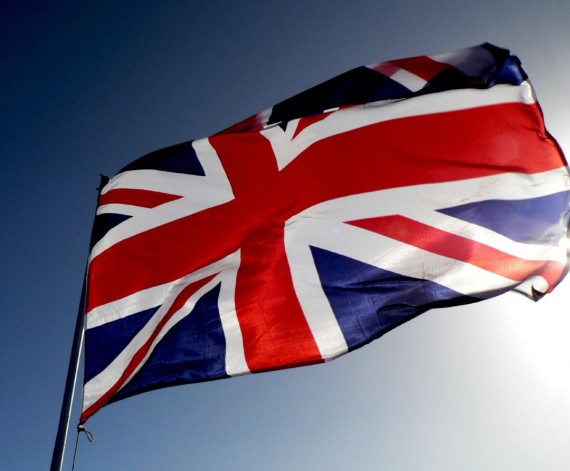

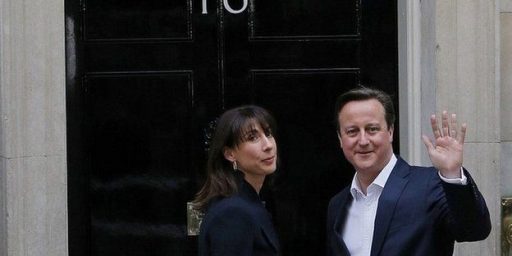
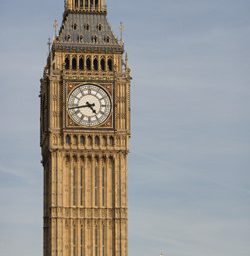
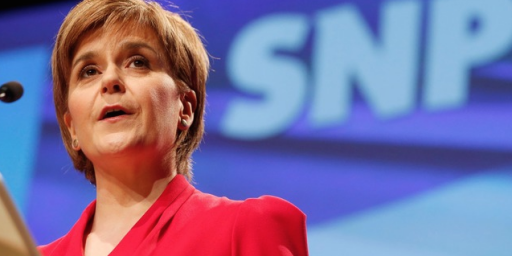

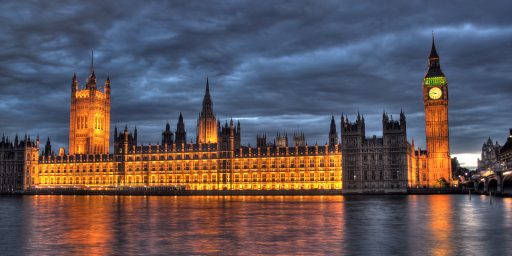
Here’s a quiz to tell you who you should be rooting for. To no great surprise, I got 89% Conservative, followed by UKIP (80%), Labour (76%), and LibDem (73%).
How very very different from the US.
There is a huge difference between the moderate and fiscally-responsible Conservative/Liberal ruling coalition, and the current radical incarnation of the Labour Party led by “Red Ed” Miliband (The “Red Ed” label was given to him by UK newspapers, not me).
But Miliband will narrowly win the election, and become Prime Minister, because being moderate and fiscally responsible doesn’t work with a changing electorate.
Sadly, being a sensible moderate conservative doesn’t seem to get a candidate any more votes than being a crazy right-wing Tea Partier. Voting is just too polarized.
@Trumwill: What a fascinating quiz! Bravely striking out even though I know little about the issues (high speed rail to Scotland? 5% cap on profits for contractors of the NHS?) I find I’m slightly more Labor (why do they persist in misspelling simple words!?) than LibDem and that I’m a liberal authoritarian (which my children would vouch for) and — best of all — I’m likely to be from Penzance. So I could take my boat with me if after the singularity our microchip overlords reassign me to that distant and northern land!
Latest Guardian poll has Labour by a point.
Nail-biter!
@Trumwill: I was 87% UKIP and 85% Conservative, but the odd thing to me was how it identified my ideology as centrist with a slight right-libertarian bent, which is what I domestic surveys peg me at.
@Trumwill: That quiz was pretty cool, thanks for sharing. I came out 99% Labour/ 96% Liberal Democrat/ 84% Sinn Féin. I’m very amused.
another nail biter election that wasn’t. LOL so much for experts once again.